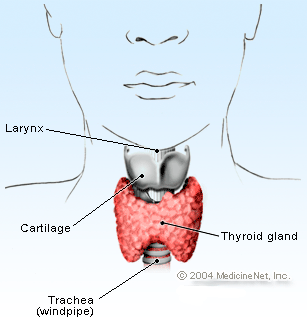|
June is Canadian Thyroid Awareness Month! In this article by Clinical Herbalist Petra Sovcov, we explore natural support strategies for hypothyroidism and discuss what it is and some of the symptoms and complications involved. Understanding HypothyroidismThe thyroid gland is the body’s internal thermostat, regulating the temperature by secreting two hormones that control how quickly the body burns calories and uses energy. If the thyroid secretes too little thyroid, hypothyroidism results. It is estimated that up to 5% of the population in the US are influenced by hypothyroidism, and it is more common in women between the ages of thirty and fifty than in men. Because thyroid gland hormones regulate metabolism in each body cell, a deficiency of thyroid hormones can affect virtually all body functions. The degree of severity of symptoms in an adult ranges from extremely mild deficiencies (pre-clinical hypothyroidism) to severe deficiency states that are life threatening (myxedema). Deficiency of thyroid hormone may be because of deficient hormone synthesis or lack of stimulation by the pituitary gland, which secretes thyroid-stimulating hormone (TSH). When thyroid hormone levels in the blood are low, the pituitary secretes TSH. If thyroid hormone levels are decreased and TSH levels are elevated in the blood, it usually indicates defective thyroid hormone synthesis. This is termed primary hypothyroidism. If TSH levels are low and thyroid hormone levels are also low, this indicates the pituitary gland is responsible for the low thyroid function. This is termed secondary hypothyroidism. The thyroid itself is a small gland, measuring about two inches across, that lies just under the skin below the Adam’s apple in the neck. The two halves (called lobes) of the gland are connected in the middle (this is called the isthmus), giving the thyroid gland the shape of a bow tie. The thyroid gland secretes thyroid hormones, which control the speed at which the body’s chemical functions proceed (metabolic rate). Thyroid hormones influence the metabolic rate in two ways:
The two thyroid hormones are T4 (Thyroxine) and T3 (Triiodothyronine). T4, the major hormone produced by the thyroid gland, has only a slight, if any, effect on speeding up the body’s metabolic rate. Instead, T4 is converted into T3, the more active hormone. The conversion of T4 into T3 occur in the liver and other tissues. To produce thyroid hormones, the thyroid gland needs iodine, an element contained in food and water. The thyroid gland traps iodine and processes it into thyroid hormones. As thyroid hormones are used, a small amount of the iodine contained is recycled to produce more thyroid hormones. Causes:Hypothyroidism is caused by an underproduction of thyroid hormone. Thyroid problems can cause many recurring illnesses and fatigue. The thyroid can be affected by poor diet, fluoride exposure in water, excessive consumption of unsaturated fats, endurance exercise, pesticide residues on fruits and vegetables, radiation from x-rays, alcohol, and drugs/certain medications. In some cases, it can also be genetic. Symptoms and Complications:Symptoms and Complications include:
Supplement Options for Hypothyroidism:
Herbal Support for Hypothyroidism:Commonly Used Herbs:
Dietary and Lifestyle Suggestions:
The Importance of Basal Body TemperatureThe basal body temperature is perhaps the most sensitive functional home test of thyroid function. Your body temperature reflects your metabolic rate, which is largely determined by hormones secreted by the thyroid gland. The function of the thyroid gland, therefore, can be determined by simply measuring your basal body temperature. All you need is a Basal Thermometer and these simple steps:
Your basal body temperature should be between 97.6 and 98.2 degrees Fahrenheit or 36.4 to 36.7 degrees Celsius. Low basal body temperatures are quite common and may reflect hypothyroidism. Article References:
3 Comments
|
Petra Sovcov is not a Medical Doctor (MD) nor a Naturopath (ND), she is a Clinical Herbal Therapist (CHT) and holds a Doctorate in Natural Medicine (DNM). The suggestions or recommendations made on this site are not meant to be a substitute for advice from your MD, or as a substitute for any prescriptions you may be taking. Suggestions followed will be the responsibility of the reader, and are stated with the intention of interest and education only. If you have a health issue, please see your primary care physician (MD) first and foremost. Categories
All
Archives
July 2024
|


 RSS Feed
RSS Feed